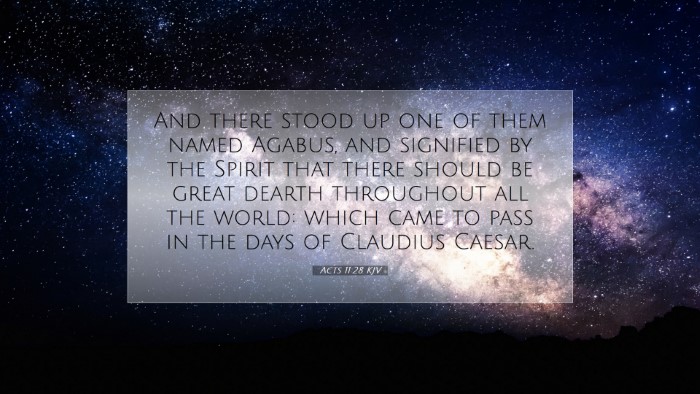Acts 11:28 - Commentary and Insights
Acts 11:28 states: "And there stood up one of them named Agabus, and signified by the Spirit that there should be a great dearth throughout all the world: which came to pass in the days of Claudius Caesar." This statement holds considerable significance within the text of the Acts of the Apostles, especially concerning prophetic insight, community response, and the early church’s mission.
Contextual Background
In this passage, we find ourselves within the broader narrative of the early church, which is characterized by rapid growth, the inclusion of the Gentiles, and challenges stemming from both internal and external sources. Agabus, a prophet known within the early Christian community, becomes a key figure in delivering a prophetic message regarding impending famine.
Historical Context
The reference to Claudius Caesar situates this event historically between AD 41 and 54. During this time, several famines are historically recorded, affirming the prophetic authenticity of Agabus. Agabus’s warning serves not just as a prediction but as a call to action for the believers in the region.
Understanding Prophecy
-
Nature of Prophecy:
According to Matthew Henry, prophecy in the early church served as a divine means of guidance and encouragement. The Holy Spirit communicated crucial knowledge about events yet to come, thereby reinforcing God’s sovereignty over history.
-
Role of Agabus:
Albert Barnes emphasizes the importance of Agabus as a recognized prophet among the apostles, suggesting that his recognition lent credibility to the message he delivered. His act of standing up to speak denotes the seriousness with which such messages were regarded in the community.
The Implications of Agabus's Prophecy
The content of Agabus's prophecy demonstrates several pivotal themes that resonate throughout the rest of the Scriptures and echo in the experiences of contemporary believers.
Preparation for Crisis
-
Preemptive Action:
The insight provided by Agabus was not merely informational but served a preparatory purpose. Adam Clarke notes that the early church often met crises with proactive measures. In this case, it led to a collective gathering of resources to assist those in need.
-
Community Solidarity:
This moment fosters a spirit of generosity and unity, as seen in the subsequent response of the church to send aid to those affected (Acts 11:29-30). In times of adversity, the church is called to exhibit compassion and communal responsibility.
Theological Insights
This verse opens avenues for deeper theological reflection regarding God’s providence and the role of prophecy in guiding His people:
God's Sovereign Plans
Agabus’s prophecy reflects God’s omniscient oversight of human history. Matthew Henry explains that foretelling such events serves to assure believers of God’s control and providence, even during times of tribulation.
Human Responsibility
While God reveals His plans, human beings are called to take responsible actions in response. The early church did not merely prepare spiritually but took tangible steps to support vulnerable communities, illustrating a powerful example of faith in action.
Conclusion
Acts 11:28 offers a profound insight into the dynamics of prophecy, community, and divine sovereignty. The involvement of figures like Agabus demonstrates the critical role of the prophetic voice in discerning God’s will and preparing His people for future challenges. Faithful response to such guidance fosters unity, compassion, and active engagement in the lives of others, securing the mission of the church in both times of peace and times of distress.
Reflections for Modern Application
In light of this verse, church leaders, theologians, and practitioners are encouraged to reflect on the following:
- How are we discerning and responding to prophetic insights within our communities?
- What measures are we taking to prepare our congregations for foreseeable crises?
- How can we cultivate an atmosphere of generosity and communal responsibility that mirrors the early church?


